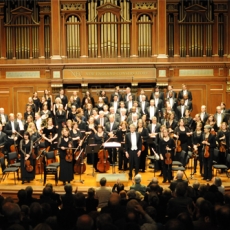Boston Baroque - Monteverdi: Ulisse - Examiner
Next Tuesday Linn Records will release a new recording of Claudio Monteverdi's second surviving opera, Il ritorno d'Ulisse in patria (the return of Ulysses to his homeland). As usual, Amazon.com has set up a Web page for taking pre-orders; but the impatient can already enjoy a digital download from iTunes. The performance is by the Boston Baroque ensemble conducted by its founder Martin Pearlman.
Monteverdi composed Il ritorno for the 1639-1640 carnival season in Venice. (Yes, the Venetian carnival lasts longer than the New Orleans Mardi Gras.) To some extent the circumstances parallel those of his earlier surviving opera L'Orfeo, composed during his service at the Gonzaga court in Mantua. I have previously described Monteverdi as the Duke's "song and dance man," responsible for keeping the guests entertained at major court affairs. For Venice Monteverdi again turned to Greek mythology; but the Teatro Santi Giovanni e Paolo probably would have had an audience that crossed over several different social classes. Furthermore, if the Duke's guests may have gotten boisterous after the wine had flowed to freely over the course of the evening; the "carnival crowd" in Venice would have been downright rowdy.
Thus, while the tale of Ulysses and Penelope is as much about the power of true love as is that of Orpheus and Eurydice, the Venetian audience would probably have been more interested in vices than in virtues. They would ultimately get their fill in the 1642-1643 carnival season with L'incoronazione di Poppea (the coronation of Poppea), which is probably the oldest (and may still be the most famous) opera in which vice is rewarded and virtue punished. Thus, while we have the "elevated" characters of Ulysses, Penelope, and Telemachus, along with a few representatives of the Olympian pantheon, we also have a generous supply of Penelope's vile suitors and the beggar Iros (Iro, described as a "parasite" in Monteverdi's libretto), all of whom come to a bad end (that probably would have made for great merriment among those in the Venetian audience).
This Linn release is the premiere recording of a new performance version that Pearlman prepared. The booklet includes an essay in which Pearlman discusses his approach, but he does not really compare his work with previous efforts. He mentions the orchestrations of Luigi Dallapiccola and Hans Werner Henze in passing; but these were "working musicians" preparing material for performance in a modern opera house. More scholarly efforts, such as those by Raymond Leppard published in 1971, are never mentioned, nor does Pearlman say anything about Monteverdi's own revisions (the most notable being the restructuring of the opera in three-act form, in contrast with the five-act structure of L'Orfeo).
Beyond scholarship, however, this recording makes for a satisfying listening experience. Instrumentalists, vocalists, and conductor all seem comfortable with taking a historically-informed approach to performance; and the listener can definitely recognize when Monteverdi was playing to the baser instincts of his audience. Still, there is a minor annoyance in the booklet. While this is a three-CD recording, nicely arranged with one CD for each of the acts, the tracks are numbered from 1 to 35. These numbers are then used for reference in both the synopsis and the libretto. Nevertheless, readers should note that adjective "minor." Listening is all that really matters, and there is more than enough to enjoy on this new recording.

